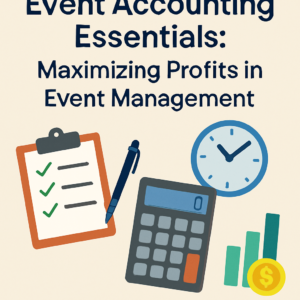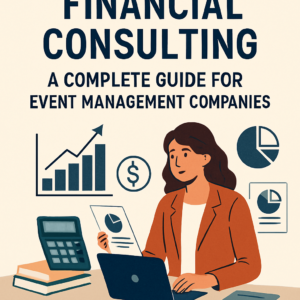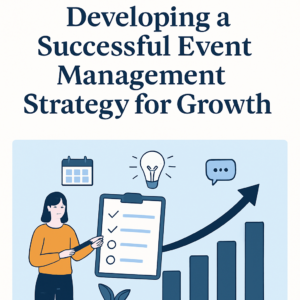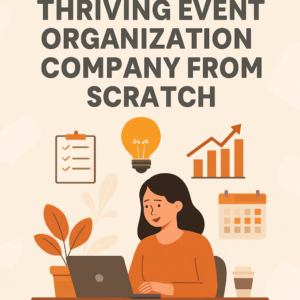Green Events: Implementing Sustainability in Corporate Event Management
Welcome to the world of sustainable event management, where creating memorable experiences doesn’t come at the expense of our planet. As a corporate event manager, you have the power to lead the charge in eco-conscious event planning. In this blog post, we’ll explore how implementing sustainability in corporate event management can enhance your business reputation, reduce costs, and contribute positively to the environment. Let’s dive into a greener approach to organizing events that align with your company’s values of being socially responsible and environmentally friendly.
Understanding Sustainability in Event Management
Let’s face it—sustainability isn’t just a buzzword anymore; it’s quickly becoming the backbone of modern event planning. As the world spins ever closer towards environmental accountability, understanding sustainability in event management is key to keeping your business relevant, ethical, and ahead of the curve.
Why Sustainability Matters
Corporate event managers are in a unique position to lead by example. By embracing sustainable practices, you can actively contribute to minimizing waste, conserving resources, and reducing carbon footprints. Imagine hosting an event that not only dazzles attendees but also leaves the planet a little better than it found it—talk about making an impact! Plus, with 75% of consumers reporting that they’re influenced by a company’s sustainability efforts when making purchasing decisions, it’s clear that going green could be great for business. [Nielsen Report]
Key Components of Sustainable Event Management
- Sustainable Venue Selection: Opt for venues that have green certifications like LEED or ISO 20121. These certifications ensure that the venue meets specific sustainability criteria.
- Eco-Friendly Events: This includes everything from using renewable resources like solar panels to harness energy during events to recycling programs at events.
- Green Transportation for Attendees: Encouraging carpooling or providing electric shuttle services reduces carbon emissions significantly.
- Sustainable Catering Options: Going organic or choosing locally sourced food options can lower your event’s carbon footprint while also supporting local businesses.
- Waste Reduction Strategies: Implement programs for composting and recycling during events to minimize waste output effectively.
Laying out these strategies is one thing; implementing them successfully is another ball game altogether. That’s where aligning your sustainable goals with financial success comes into play. (You might want to check out our detailed guide on how strategic event planning can help you achieve just that: Strategic Event Planning: Aligning Business Goals with Financial Success)
Sustainability as a Culture
Sustainability isn’t just about what you do—it’s about who you are as an organization. By embedding environmentally friendly practices into your company culture, not only do you enhance employee engagement and satisfaction, but you also create a ripple effect that extends far beyond your business.
The journey towards sustainable event management might seem daunting at first glance, but every small step counts. Remember, even Rome wasn’t built in a day—but they probably wished they’d used eco-friendly materials!
Key Strategies for Sustainable Event Planning
Alright, fellow event maestros, let’s dive into the nitty-gritty of making your events not just unforgettable but earth-huggingly sustainable. We all know the drill—clients want show-stopping events without leaving a hefty carbon footprint. So, how do we pull this off without breaking a sweat or the planet?
Start with Sustainable Venue Selection
The first order of business is choosing a venue that walks the talk on sustainability. Look for venues with certifications like LEED or ISO 20121. These places have already ticked off numerous eco-friendly boxes, from energy efficiency to waste management. It’s like ordering takeout and finding out they threw in dessert—total win-win!
Reduce, Reuse, Recycle—and Then Some
- Reduce: Aim to minimize waste by planning ahead. Use digital invitations and materials instead of paper ones.
- Reuse: Opt for decor that can be reused or rented. Think elegant table settings that don’t scream single-use plastic.
- Recycle: Set up clear recycling stations at the venue and ensure they’re well labeled.
For those who want to go above and beyond, consider partnering with local recycling programs to handle event waste efficiently.
Sustainable Catering Options
Your attendees might not remember the keynote speaker’s name, but they’ll definitely remember what they ate! Choose catering companies committed to sustainable practices. This means locally sourced ingredients, organic options, and environmentally friendly packaging. Hey, if you can swap something as simple as plastic cutlery for compostable alternatives, why not do it?
Green Transportation for Attendees
The journey is just as important as the destination—at least when it comes to sustainability in event management. Encourage attendees to use public transport or carpool by providing incentives like discounted tickets or prime parking spots for shared rides.
Strategic Event Planning: Aligning Business Goals with Financial Success.
The Power of Digital Solutions
If there’s one thing we’ve learned in this digital age, it’s that going paperless isn’t just good for trees; it’s also pretty chic! Utilize apps and platforms for everything from ticket sales to post-event surveys. Not only does it keep things streamlined and efficient, but it also significantly reduces the need for printed materials.
A Final Word: Measure Impact Post-Event
Nailing sustainability isn’t just about what happens during the event—it’s also crucial to evaluate afterward. Conduct a post-event analysis focusing on your sustainability metrics: how much waste was reduced? What’s your actual carbon footprint compared to previous events? This is where you turn lessons into future strategies because there’s always room for improvement!
The Role of Technology in Eco-Friendly Events
Hey there, fellow event maestros! Let’s talk tech—specifically, how technology can transform your events into eco-friendly extravaganzas. The journey to sustainability in event management is paved with digital wonders that help reduce the environmental impact while keeping the fun alive. No need for a magic wand when you have these digital tools at your disposal!
1. Virtual Platforms: Less Travel, More Green
Let’s kick things off with virtual platforms. With more companies opting for hybrid or fully virtual events, we’ve cut down on travel emissions significantly. According to a study by World Economic Forum, hybrid events can save up to 90% of carbon emissions compared to traditional in-person gatherings—talk about a win-win!
2. Digital Registration and Tickets: Bye-Bye Paper Waste
Remember those days of printing out heaps of registration forms and tickets? Yeah, neither do we—thank you, digital registration! Using online platforms for attendee sign-ups not only saves paper but also streamlines the registration process. Plus, it gives attendees one less thing to lose at the bottom of their suitcase.
3. Event Apps: Your Personal Green Assistant
- Sustainable Scheduling: Event apps can optimize scheduling to ensure efficient use of space and resources.
- Instant Updates: Ditch the paper programs; send updates directly to your attendees’ smartphones.
- Engagement Tools: Polls and feedback systems encourage interaction without the need for printed surveys.
You might want to check out our tips on how strategic planning aligns with financial success over at Strategic Event Planning: Aligning Business Goals with Financial Success. These insights might just be what you need to keep both the planet and your bank account happy!
4. Live Streaming: Go Global Without Leaving Your Desk
If reaching a wider audience without raising your carbon footprint is on your agenda, live streaming is your new best friend. Going live allows you to engage audiences near and far without any additional travel-related emissions—a truly global reach achieved from the comfort of one location.
5. AI-Powered Insights: Data-Driven Decisions
Embrace AI-based analytics for smarter decision-making that prioritizes sustainability. From optimizing energy usage in venues to predicting crowd flow for better resource allocation, these insights are invaluable for eco-conscious event scenarios.
The digital revolution isn’t just about convenience; it’s about making responsible choices that resonate with our planet’s needs. By embracing technology, we can orchestrate events that are not only memorable but also sustainable—because saving Mother Earth should be on everyone’s guest list!
If you’re keen on diving deeper into how technology can aid sustainability while boosting financial metrics, don’t miss out on exploring our guide on The Ultimate Guide to Fractional CFO Services for Event Management Companies. It’s packed with insights to keep your business thriving sustainably!
Sustainable Supply Chain Management
When it comes to sustainability in event management, the supply chain is an unsung hero. Think of it as the behind-the-scenes magician that ensures every eco-friendly aspect of your corporate event runs smoothly. This isn’t just about ordering bamboo cutlery or biodegradable name tags—though those are cool, too! It’s about weaving sustainability into every thread of your event’s fabric.
The Green Gears in Motion
- Vendor Selection: Partner with suppliers who share your eco-conscious values. Look for vendors with certifications like ISO 20121 or LEED, which demonstrate their commitment to sustainable practices.
- Local Sourcing: Opt for local vendors to reduce transportation emissions. Need flowers? Choose a nearby farm instead of importing exotic blooms from overseas.
- Ethical Sourcing: Ensure materials and products are ethically sourced, minimizing environmental impact and supporting communities worldwide.
You might be thinking, “This sounds like juggling flaming torches while riding a unicycle!” But rest assured, it’s more manageable than it seems. According to a study by the Global Association of the Exhibition Industry (UFI), implementing sustainable practices can reduce costs by up to 25% in some cases—proving that green choices can be as kind to your budget as they are to the planet.
Tangible Impact: A Case Example
A shining beacon in sustainable supply chains is the IMEX Group’s annual trade show, which has been recognized for its extensive green strategies. By partnering with suppliers who prioritize sustainability, they’ve managed not only to showcase innovative products but also significantly cut down on waste and energy use during their events.
Your Path Forward
Adopting sustainable supply chain practices may seem daunting at first glance, but small steps can lead to significant changes. Begin by auditing your current supply chain processes—what’s working? What’s not? Use this information to create a roadmap toward a more sustainable future.
Remember, integrating sustainability isn’t just a trend; it’s aligning with broader business goals for future success—a principle we at Kommas with Kelle deeply understand as we help businesses achieve financial success through strategic planning.
The Importance of Green Logistics
Alright, folks, let’s talk about green logistics and why it’s the unsung hero of sustainability in event management. Imagine orchestrating a grand symphony of eco-friendly practices that seamlessly come together to create not just an event, but an experience that resonates with Mother Earth’s approval. Now, doesn’t that sound like an encore-worthy feat?
The Eco-Essence of Logistics
Green logistics involves the strategic planning and execution of sustainable transportation, supply chain management, and resource allocation to minimize environmental impact. Here’s where the magic lies: efficient logistics can dramatically reduce the carbon footprint of your event.
- Carbon Footprint Reduction: By optimizing travel routes and consolidating deliveries to venues, you can slice down unnecessary emissions.
- Resource Optimization: Utilizing multi-use containers or opting for local sourcing reduces waste and supports regional economies.
- Energy Efficiency: Incorporating electric vehicles or biodiesel-powered transportation curtails fossil fuel dependency.
A compelling case study by the Green Meeting Industry Council demonstrated a notable decrease in carbon emissions by up to 30% when companies incorporated green logistics into their planning process (source). It’s not only about saving the planet—it’s also about crafting a narrative that appeals to today’s eco-conscious clients.
Practical Steps for Implementation
Diving into green logistics might feel like navigating through a maze blindfolded, but trust me, it’s simpler than it sounds. Here’s how you can kickstart your journey:
- Select Sustainable Suppliers: Partner with suppliers who share your commitment to sustainable practices. Look for certified vendors who align with standards like ISO 20121 or LEED.
- Go Digital: Embrace digital solutions for sustainable events—think mobile apps instead of printed schedules. Not only are you saving trees, but you’re also reducing logistical headaches.
- Utilize Smart Tech: Use technology like RFID tracking for assets to optimize transport routes and cut down on vehicle emissions.
- Date With Data: Regularly assess your logistics data to identify areas of improvement. Continuous tweaking brings you closer to perfection in sustainability (financial metrics, anyone?).
If you’re wondering whether all this effort is worth it, consider the positive ripple effects on your brand reputation. Clients love responsible companies; they feel good partnering with businesses making strides towards sustainability. And hey, being a pioneer in green practices might just spark some serious buzz at your next networking event!
A little investment in green logistics goes a long way—not only does it benefit the environment but it also aligns seamlessly with strategic event planning designed for financial success (find out more here). By implementing eco-friendly practices throughout every stage—from planning through execution—you’ll ensure continued success that echoes far beyond the final curtain call.
Evolving Towards Zero Waste Events
Hey there, eco-warrior event planners! If you’ve ever looked at the aftermath of a corporate event and thought, “Wow, that’s a lot of trash,” then you’re in the right place. The journey towards zero waste events isn’t just about swapping out plastic forks for compostable ones and calling it a day. It’s an entire mindset shift that can transform your events into sustainable showcases. So, how do we do this without turning into eco-vigilantes? Let’s dive in!
Understanding Zero Waste Principles
Zero waste isn’t just a buzzword; it’s a philosophy that encourages the redesign of resource life cycles so that all products are reused. The goal is to send no trash to landfills, incinerators, or the ocean. Sounds idealistic? Maybe. But with a strategic approach, it’s achievable.
- Reduction: Start by analyzing what items can be reduced in quantity or replaced with sustainable alternatives. For instance, digital invitations instead of paper ones can significantly cut down on waste.
- Reuse: Implement systems where materials can be reused for multiple events. This can include décor items like tablecloths and centerpieces.
- Recycling: Ensure proper segregation at your events and partner with local recycling firms to handle waste responsibly.
Tackling Common Waste Culprits
No matter how well you plan, some elements consistently contribute to waste at events. Here’s how you can tackle them:
- Catering Waste: Choose caterers who offer sustainable catering options like locally sourced ingredients and compostable dishware.
- Decorative Elements: Opt for biodegradable decorations or those made from recycled materials.
- Printed Materials: Go digital! Use apps for event schedules and QR codes for information distribution rather than printed pamphlets.
The Financial Side of Zero Waste Events
You might wonder if going green will turn your budget red, but here’s some good news: embracing sustainability often reduces costs in the long run by minimizing material expenses and maximizing efficiency. Strategic event planning, which aligns business goals with financial success, can effectively integrate zero waste practices without breaking the bank.
You don’t have to take our word for it—look at companies that have adopted these principles successfully. Not only do they boast about lower carbon footprints, but they often see improved brand loyalty as attendees appreciate their commitment to sustainability.
A Cultural Shift in Event Planning
The move towards zero waste is as much about culture as it is about logistics. Encourage everyone involved—from your team to vendors—to adopt green practices. Host workshops or training sessions on sustainability in event management to ensure everyone’s on the same page.
“A sustainable future is not just an option—it’s a necessity.” — GreenBiz
Your mission should you choose to accept it: make each corporate event not just memorable but also environmentally responsible. And remember, every small step counts towards making zero waste not just feasible but fabulous!
Evaluating Sustainability Post-Event
Alright, the confetti has settled, the applause has faded, and now it’s time to roll up those sleeves and dive into evaluating how green your event truly was. It’s like that crucial moment when you step back and assess if your new composting bin is actually making a dent in your household waste—except on a larger scale! So, how exactly do you evaluate sustainability in event management effectively? Let’s break it down.
1. Collect Data Like a Pro
- Waste Audit: Start by conducting a thorough waste audit. Gather data on how much waste was generated versus how much was successfully recycled or composted. This provides tangible insights into where improvements can be made for future events.
- Energy Consumption: Track the energy usage throughout the event. Did those LED lights save as much energy as you hoped? This is where energy-efficient monitoring tools really shine!
- Feedback Forms: Incorporate questions related to sustainability into post-event surveys for attendees, vendors, and staff to gather qualitative feedback.
2. Analyze Your Carbon Footprint
The goal of every eco-conscious planner should be to strive towards carbon neutrality. Use tools like the Carbon Trust’s footprint calculator to analyze the carbon emissions produced during your event. From there, consider offsetting these emissions with initiatives such as planting trees or investing in renewable energy projects.
3. Evaluate Compliance with Standards
If you’ve aimed for green certification from agencies like ISO 20121 or LEED standards, evaluate compliance thoroughly. Was every guideline adhered to? Perhaps some areas need more attention for next time, which brings us one step closer to creating sustainable event solutions that are certified and recognized internationally.
4. Learn from Experiences
- Sustainable Venue Selection: Reflect on whether the chosen venue lived up to its eco-friendly promises. Did their practices align with sustainable hospitality standards?
- Sustainable Supply Chain: Assess your supply chain partners’ commitment to sustainability. Were they using compostable materials or ethical sourcing avenues? If not, consider partnering with more eco-conscious vendors next time.
- Biodiversity Impact: Consider if local biodiversity was respected and impacted positively by your event planning decisions.
This post-event evaluation phase isn’t just about patting yourself on the back (though some well-deserved self-high-fives are definitely encouraged). It’s about identifying what worked and what didn’t so that each shift towards sustainability becomes part of an ongoing journey rather than a one-time feat—a journey that aligns not only with our planet’s health but also with financial success through strategic planning aligning business goals with financial success.
The real magic happens when we learn from each event and adapt our strategies accordingly—because nothing says “we care” quite like an ever-improving plan towards greener pastures!
The Benefits of Green Practices for Your Business
Ah, the sweet scent of sustainability in event management! You might think it’s just a trend, but going green is much more than an Instagram hashtag. For corporate event managers like yourself, embracing sustainable practices can be the secret sauce that not only benefits the environment but also boosts your bottom line. But wait, there’s more!
1. Enhanced Brand Image
Adopting sustainable event strategies positions your company as a leader in corporate social responsibility (CSR). Today’s clients are increasingly eco-conscious and prefer doing business with companies that share their values. According to a Forbes article, 88% of consumers want brands to help them make a difference environmentally.
- Your commitment to green practices can lead to stronger client relationships.
- It enhances your reputation, distinguishing you from competitors still stuck in the “take-make-waste” cycle.
2. Cost Efficiency
Implementing energy-efficient events and waste reduction strategies can significantly cut costs. Think about it: less waste means less money out the door, quite literally! For instance:
- Sustainable venue selection: Opt for venues with green certification like LEED standards that often come with built-in energy savings.
- Digital solutions: Ditching paper programs for digital ones not only saves trees but also printing costs.
3. Competitive Edge
The market isn’t getting any easier, folks! Yet, incorporating ethical event management practices can give you that crucial competitive edge. As more businesses jump on the green bandwagon, those left behind might find themselves gasping for air (and clients).
4. Increased Employee Engagement
Your team will thank you too! Sustainable initiatives often lead to higher levels of employee satisfaction and retention. Employees love working for companies that reflect their personal values—hello loyalty!
The Long Game: Building Profitable Corporate Event Management Companies
If you’re interested in how these sustainable strategies align with financial success, check out our insights at Strategic Event Planning: Aligning Business Goals with Financial Success. It’s all about making sure your green efforts pay off—not just ethically but also financially.
So, dear event maestro, as you waltz through the maze of sustainable event planning, remember: you’re not only planning events—you’re shaping futures!
Your Role in Shaping a Sustainable Future through Events
Hey there, fellow event maestros! 🌿 Let’s face it: In the bustling world of sustainability in event management, you’ve got the power to be an absolute superhero. Imagine this: every detail, from the first brainstorm session to post-event evaluations, is an opportunity to make our planet just a little greener. And trust us, Mother Earth will thank you for it!
1. Start with the Big Picture: Sustainability Goals
First things first, it’s crucial to have a clear set of sustainable goals. Whether it’s reducing waste by 50% or opting for venues with LEED certification, having tangible objectives sets the stage for success. Did you know that according to the United Nations, sustainable events can significantly reduce environmental impact and promote social inclusivity?
2. The Devil is in the Details: Eco-friendly Practices
- Sustainable Venue Selection: Opt for venues that prioritize energy efficiency and have green certifications.
- Waste Reduction: Implement recycling programs and use compostable materials wherever possible.
- Sustainable Catering Options: Choose locally-sourced, seasonal menus that minimize carbon footprint.
- Green Transportation: Encourage attendees to carpool or use public transit.
The simple act of using digital solutions over paper can save tons of trees—literally. Plus, who doesn’t love a good app that keeps everything organized and at your fingertips?
3. Engage Everyone: A Collective Effort
You’re not in this alone! Engaging vendors, sponsors, and attendees in your green mission makes a massive difference. Share your sustainability initiatives upfront and invite collaboration. Remember that old saying, “Teamwork makes the dream work”? Well, it also makes sure we leave behind fewer carbon footprints!
The Financial Impact of Going Green
This wouldn’t be Kommas with Kelle without a nod to financial savvy! 💰 Implementing sustainable practices isn’t just good for the planet—it’s smart business too. Companies embracing sustainability often see increased brand loyalty and potential cost savings over time (just think about saving on all those printing costs!). For more on aligning green strategies with financial success, check out our detailed guide on financial best practices for event coordination companies.
Your influence extends far beyond hosting incredible events; you’re laying down tracks toward a more sustainable future. So go ahead—flex those eco-conscious muscles and leave an indelible mark on both your industry and our planet!









